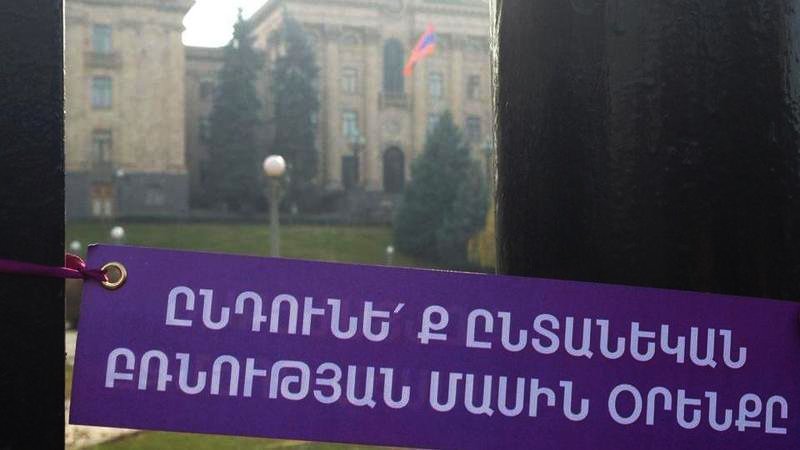On April 12, Armenia’s National Assembly made history by approving a comprehensive set of amendments to the Law on Prevention of Domestic Violence, Protection of Persons Subjected to Domestic Violence, and Restoration of Peace in the Family. This groundbreaking move represents the first significant overhaul of the law since its adoption in 2017.
The amendments offer a robust framework for addressing domestic violence, with provisions aimed at providing greater protection and support to survivors. The amended law reflects a commitment to upholding the rights and dignity of all individuals affected by domestic violence by offering clearer definitions of abuse, enhanced legal protections for children who witness violence, expanded medical care for victims and stronger measures to hold perpetrators of violence accountable for their crimes.
Armenia has made remarkable progress since gaining independence in 1991 in addressing domestic violence. For decades, this issue was shrouded in taboo, misconception and stereotypes that further victimized those experiencing abuse.

Grassroots activism, civil society protests and advocacy, alongside pressure from the European Union, led the government to adopt the Law on Prevention of Domestic Violence, Protection of Persons Exposed to Domestic Violence, and Restoration of Peace in the Family in 2017. The law was imperfect but served as a crucial initial step toward progress.
In 2022, members of Parliament Zaruhi Batoyan, Sona Ghazaryan and Tsovinar Vardanyan led a bill aimed at amending this crucial legislation and related laws. The Women’s Support Center, Armenia’s leading domestic violence center, played a pivotal role in crafting the bill by presenting a comprehensive package of proposals to its authors, most of which were incorporated into the final legislation. Two years of discussions ensued among state and non-state actors before the amendments were passed in Parliament.
Transformative impact of the new domestic violence legislation
- Comprehensive definitions of all forms of domestic violence
By offering clearer and more comprehensive definitions of domestic violence, the amendments ensure that all forms of abuse are properly recognized and addressed. Survivors who seek refuge at the Women’s Support Center recount harrowing experiences of being trapped in their own homes, subjected to constant surveillance and denied basic freedoms and medical care. Unfortunately, the previous legal framework fell short in adequately responding to these realities, with only a handful of cases addressing severe mental suffering. This highlights the urgent need for precise and inclusive definitions around domestic violence.
- Emphasis on inclusivity and accessibility
One of the most important aspects of these amendments is the emphasis on inclusivity and accessibility. Regardless of marital status or sexual orientation, all individuals impacted by domestic violence are entitled to equal rights and protections under the law. In Armenia, a considerable portion of marriages remain unofficially registered, and domestic violence frequently occurs within intimate or dating partnerships. Now, victims in these circumstances can be offered protections. Additionally, the law now requires shelters to be accessible, ensuring that no survivor is left behind and signaling a commitment to a more inclusive and supportive society.
- Stronger sanctions for perpetrators of domestic violence
Stricter language around police-issued emergency protective orders and increased accountability for perpetrators have also been introduced. Consequently, the revised criminal code includes more substantial fines, sanctions and prison sentences tailored to the severity of the offense, sending a clear message to the public that domestic violence is a serious crime. The amendments specify that perpetrators targeting vulnerable and marginalized groups, such as people with disabilities, will face even harsher sanctions, demonstrating a commitment to protecting all members of our community. Additionally, the amendments outline specific consequences for repeat offenders, signaling a firm stance that repeated acts of violence will be met with swift and decisive punishment. By ensuring that perpetrators face tougher penalties and sanctions, we firmly declare that domestic violence has no place in our society.
- Investment in domestic violence prevention and training
Beyond immediate response and protection, the amendments also prioritize prevention efforts and professionalized training for law enforcement to strengthen the capacity of first responders. In doing so, Armenia is taking proactive steps towards creating a society where domestic violence is not tolerated.
In essence, these amendments represent a significant milestone in Armenia’s journey towards addressing domestic violence. They embody the collective efforts of advocates, lawmakers and survivors to create a more just and compassionate society for all. As we celebrate this progress, let us recommit ourselves to the ongoing work of building a future where every individual can thrive free from violence and fear. We need strong legislation, coupled with a societal reckoning that domestic violence should not be tolerated, to end this practice.


Be the first to comment